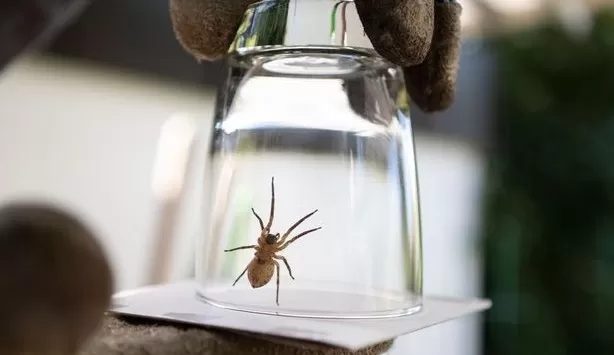Keep your home critter-free using natural solutions. Say goodbye to chemical pesticides and embrace herbal, fruity, or soap-based remedies for pesky pests like ants, mice, and mosquitos.
Natural Pest Control: Effective and Nontoxic Solutions
Traditional insect and rodent repellents often contain toxic ingredients that can be harmful to both pests and humans.
Fortunately, you can keep your home free from pests without resorting to chemical-based products. Embrace these natural remedies to maintain a pest-free and chemical-free environment in your house:.
Essential Oils
Many essential oils have natural insect-repellent properties.
Create a solution by mixing a few drops of essential oil with water in a spray bottle. Peppermint, eucalyptus, lavender, and citronella oils are known to repel common pests.
Spray this mixture around entry points, windowsills, and other areas where pests may enter.
Vinegar
Vinegar is a versatile household ingredient that can repel various pests.
Create a vinegar solution by mixing equal parts water and vinegar in a spray bottle. Spray it along baseboards, countertops, and other areas where pests are present.
The strong scent of vinegar acts as a deterrent for many insects.
Diatomaceous Earth
Diatomaceous earth is a natural powder made from fossilized diatoms.
It is effective against crawling insects like ants, cockroaches, and bed bugs. Sprinkle a thin layer of diatomaceous earth in areas where pests frequent, such as along baseboards or in cracks and crevices.
The powder damages the exoskeleton of insects, leading to dehydration and eventual death.
Mesh Screens
Install mesh screens on doors and windows to prevent flies, mosquitoes, and other flying insects from entering your home.
Ensure that the screens are in good condition and without any holes or tears.
Cleanliness and Organization
Pests are attracted to food and clutter.
Keep your kitchen and dining areas clean by promptly cleaning up spills, sealing food in airtight containers, and regularly emptying garbage bins. Declutter your living spaces to minimize hiding spots for pests.
Natural Traps
Use nontoxic traps to capture and remove pests.
For example, a mixture of sugar and borax can be an effective bait for ants. Place the bait in a small container near their trails.
Sticky traps can also be useful for catching insects like flies and spiders.
Remember, patience is key when using natural remedies.
It may take some time for the effects to be noticeable. If you’re dealing with a severe infestation or persistent pest problems, it’s advisable to seek professional pest control assistance.
By adopting these natural pest control methods, you can effectively repel pests while ensuring the safety of your family, pets, and the environment.
Repel Flies Naturally with Basil

Flies can be a nuisance in your home, but you don’t need to rely on chemical repellents.
Basil, a common herb found in many kitchens, can effectively deter flies with its strong scent. Follow these simple tips to keep flies away using basil:
Potted Basil: Place pots of fresh basil at doorways, windowsills, and on your kitchen counter.
Flies dislike the smell of basil, so having these plants strategically located can help deter them from entering your home. Make sure the basil plants receive enough sunlight to thrive.
Dried Basil: If you don’t have enough sunlight to grow potted basil, you can still utilize dried basil as a fly repellent.
Put dried basil leaves in a small muslin pouch or sachet. Rub the pouch occasionally to release the strong scent of basil.
Place these pouches near doorways and windowsills or any areas where flies tend to gather.
Basil Spray: Create a homemade basil spray by boiling fresh basil leaves in water.
Allow the mixture to cool and strain out the leaves. Pour the liquid into a spray bottle and use it to spray around doorways, windows, and other fly-prone areas.
Refresh the spray every few days to maintain its effectiveness.
Basil Essential Oil: Another option is to use basil essential oil.
Mix a few drops of basil essential oil with water in a spray bottle. Shake well and spray it in areas where flies are a problem.
Be cautious when using essential oils around pets, as some oils may be toxic to them.
Remember, while basil can help deter flies, it may not eliminate them completely.
Combining basil with other natural fly control methods, such as maintaining cleanliness, removing food sources, and using screens on doors and windows, will provide more effective results.
By using basil as a natural fly repellent, you can create a pleasant-smelling environment while keeping pesky flies at bay without resorting to harmful chemicals.
Natural Spider Repellent: Citrus

Spiders can be unwelcome guests in your home, but you don’t have to resort to toxic chemicals to keep them away.
Citrus, with its strong scent, can effectively repel spiders naturally. Follow these simple tips to deter spiders using citrus:.
Citrus Spray: Create a citrus spray by mixing water with unsweetened lemon or lime juice in a spray bottle.
Shake the bottle well to ensure proper mixing. Wipe down your countertops with the citrus mixture to deter spiders from crawling on them.
You can also spray the mixture around doorways, windowsills, and other spider-prone areas. Remember to reapply the spray periodically for continued effectiveness.
Citrus Peels: Spiders are not fans of the scent of citrus peels.
Collect lemon, orange, or lime peels and scatter them in your garden or place them near potential spider entry points, such as windowsills or doorways. Replace the peels regularly to maintain their effectiveness.
Citrus Essential Oil: Another option is to use citrus essential oil.
Add a few drops of lemon, orange, or lime essential oil to water in a spray bottle. Shake well and spray the mixture in areas where spiders are commonly found.
Take care when using essential oils around pets, as some oils may be toxic to them.
While citrus can help deter spiders, it may not eliminate them entirely.
Combine the use of citrus with other natural spider control methods, such as regular cleaning, sealing cracks and crevices, and removing clutter to create a less inviting environment for spiders.
By using citrus as a natural spider repellent, you can keep your home spider-free without resorting to harmful chemicals.
Enjoy the fresh and invigorating scent of citrus while deterring spiders from taking up residence in your space.
Natural Ant Repellent: Vinegar

Dealing with ants can be a nuisance, but you don’t have to rely on harsh chemicals to keep them at bay.
Vinegar, a pantry staple, can serve as a natural ant repellent. Follow these simple steps to deter ants Using Vinegar:.
Create a Vinegar Solution: Mix equal parts of vinegar and water to make a 50/50 solution.
Pour the solution into a spray bottle for easy application.
Wipe Down Surfaces: Identify areas where you have spotted ants, such as countertops, windowsills, and entry points.
Spray the vinegar solution directly onto these surfaces and wipe them down thoroughly. Pay extra attention to areas where ants are commonly seen.
Repeat this process several times a day for best results.
Destroy Scent Trails: Ants use scent trails to navigate and communicate with each other.
The vinegar solution disrupts these trails, making it harder for ants to find their way. By regularly wiping down surfaces with the vinegar solution, you eliminate the scent trails and discourage ants from returning.
Focus on Prevention: In addition to using vinegar, take proactive measures to prevent ant infestations.
Keep your kitchen clean, store food in airtight containers, and promptly clean up any spills or crumbs. Seal cracks and crevices where ants might enter your home, and trim tree branches and shrubs away from the exterior walls to prevent easy access for ants.
While vinegar can be effective in deterring ants, it may not eliminate the problem entirely.
If you’re dealing with a persistent ant issue, consider seeking professional pest control advice.
By using vinegar as a natural ant repellent, you can keep your home ant-free while avoiding the use of harmful chemicals.
Embrace the power of vinegar to deter ants and maintain a clean and pest-free environment in your home.
*The information is for reference only.